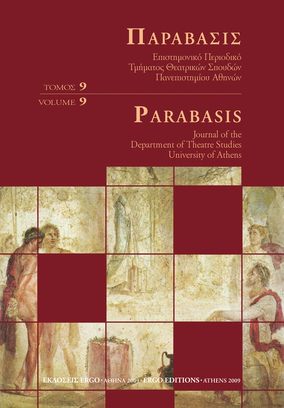Το δίκαιο του ικέτη και το πολιτικό άσυλο στην ελληνική τραγωδία
Part of : Παράβασις : επιστημονικό περιοδικό Τμήματος Θεατρικών Σπουδών Πανεπιστημίου Αθηνών ; Vol.5, No.1, 2004, pages 103-111
Issue:
Pages:
103-111
Parallel Title:
Suppliants's and refugee's rights in Greek tragedy
Section Title:
Μελέτες και άρθρα
Author:
Abstract:
Greek tragedy often presents unprotected persons trying to bind a king or a hero by a promise securing their own life or inviolability against enemies or persecutors. Dramatically speaking, the most interesting case of a suppliant is that of the refugee. Aeschylus’ Suppliant Women, as well as Euripides’ Suppliant Women and Heraclidae, focuse on a demand put forward by foreigners who need help and political protection. In principle, the leader receiving foreigners as suppliants in his country has to prevent any insult against them. Gods (and especially Zeus) are the guarantors of the suppliants rights and nobody would risk to oppose their will.However, protection of suppliants sometimes happens to be subject to dispute. Beside gods and unwritten laws, there are social, political and ethical problems to be solved, in case the suppliant’s city claims his extradition. In other terms, political refuge is granted under conditions. The eventual blood relation or friendship between the suppliant and his protector, the legal or illegal character of refugees’ request, the “international” relations and customs concerning crime, exile and refuge, the degree of political dependence between the city-persecutor and the city-protector, as well as the dangers related to the possibility of a “diplomatic incident” -or even a war-, are some of the crucial points to take into account, before deciding to defend or satisfy the suppliants’ needs. In any case, the status of the refugee, as greek drama depicts it, gives evidence for an elevated conception of right, justice and humanism in ancient Greece, despite the absence of a strict body of laws.
Subject (LC):




